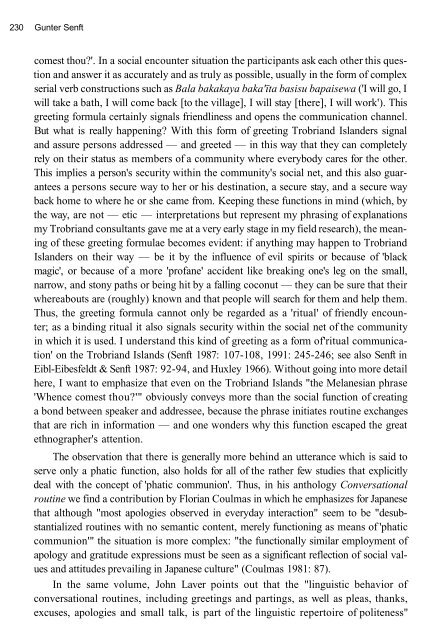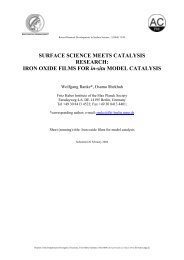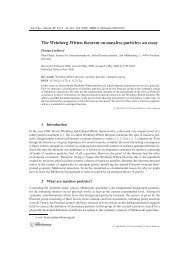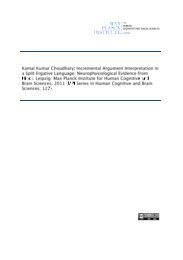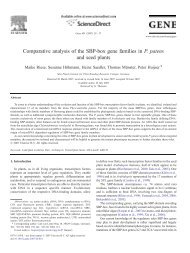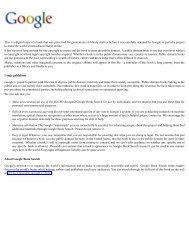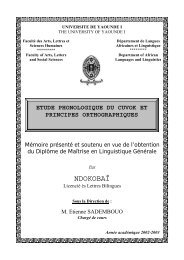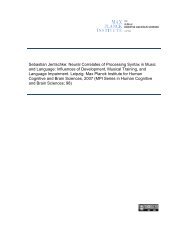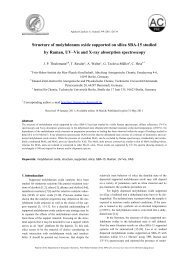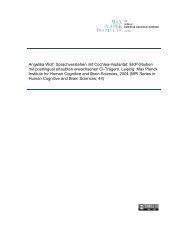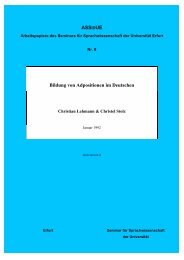Phatic communion - PubMan
Phatic communion - PubMan
Phatic communion - PubMan
Create successful ePaper yourself
Turn your PDF publications into a flip-book with our unique Google optimized e-Paper software.
230 Gunter Senft<br />
comest thou?'. In a social encounter situation the participants ask each other this question<br />
and answer it as accurately and as truly as possible, usually in the form of complex<br />
serial verb constructions such as Bala bakakaya baka'ïta basisu bapaisewa ('I will go, I<br />
will take a bath, I will come back [to the village], I will stay [there], I will work'). This<br />
greeting formula certainly signals friendliness and opens the communication channel.<br />
But what is really happening? With this form of greeting Trobriand Islanders signal<br />
and assure persons addressed — and greeted — in this way that they can completely<br />
rely on their status as members of a community where everybody cares for the other.<br />
This implies a person's security within the community's social net, and this also guarantees<br />
a persons secure way to her or his destination, a secure stay, and a secure way<br />
back home to where he or she came from. Keeping these functions in mind (which, by<br />
the way, are not — etic — interpretations but represent my phrasing of explanations<br />
my Trobriand consultants gave me at a very early stage in my field research), the meaning<br />
of these greeting formulae becomes evident: if anything may happen to Trobriand<br />
Islanders on their way — be it by the influence of evil spirits or because of 'black<br />
magic', or because of a more 'profane' accident like breaking one's leg on the small,<br />
narrow, and stony paths or being hit by a falling coconut — they can be sure that their<br />
whereabouts are (roughly) known and that people will search for them and help them.<br />
Thus, the greeting formula cannot only be regarded as a 'ritual' of friendly encounter;<br />
as a binding ritual it also signals security within the social net of the community<br />
in which it is used. I understand this kind of greeting as a form of'ritual communication'<br />
on the Trobriand Islands (Senft 1987: 107-108, 1991: 245-246; see also Senft in<br />
Eibl-Eibesfeldt & Senft 1987: 92-94, and Huxley 1966). Without going into more detail<br />
here, I want to emphasize that even on the Trobriand Islands "the Melanesian phrase<br />
'Whence comest thou?'" obviously conveys more than the social function of creating<br />
a bond between speaker and addressee, because the phrase initiates routine exchanges<br />
that are rich in information — and one wonders why this function escaped the great<br />
ethnographer's attention.<br />
The observation that there is generally more behind an utterance which is said to<br />
serve only a phatic function, also holds for all of the rather few studies that explicitly<br />
deal with the concept of 'phatic <strong>communion</strong>'. Thus, in his anthology Conversational<br />
routine we find a contribution by Florian Coulmas in which he emphasizes for Japanese<br />
that although "most apologies observed in everyday interaction" seem to be "desubstantialized<br />
routines with no semantic content, merely functioning as means of 'phatic<br />
<strong>communion</strong>'" the situation is more complex: "the functionally similar employment of<br />
apology and gratitude expressions must be seen as a significant reflection of social values<br />
and attitudes prevailing in Japanese culture" (Coulmas 1981: 87).<br />
In the same volume, John Laver points out that the "linguistic behavior of<br />
conversational routines, including greetings and partings, as well as pleas, thanks,<br />
excuses, apologies and small talk, is part of the linguistic repertoire of politeness"


